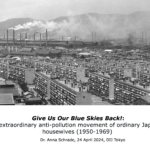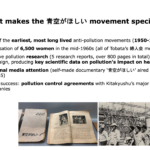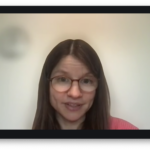
Download
Venue
Online
Registration Info
This is a past event. Registration is no longer possible.
DIJ Mailing Lists
Please subscribe below to stay informed about our research activities, events & publications:
“Give Us Our Blue Skies Back!” The extraordinary anti-pollution movement of ordinary Japanese housewives (1950-1969)
April 24, 2024
Anna Schrade, independent scholar
“Give us Our Blue Skies Back!” is the catchphrase under which nearly 7,000 women in Tobata (Kitakyushu) mobilised against emissions from local industries, above all from Yahata Steelworks – one of Japan’s most important and prestigious companies then. Most of the activists were ordinary housewives with little formal education and without political experience, acting in Japan’s periphery, 2,000 kilometers away from Tokyo. Yet, these housewives executed one of the earliest, longest, and most sophisticated anti-pollution movements in Japan’s postwar history, spanning from 1950 to 1969. Their key to success was the clever use of science, and from the start in 1950, they generated new scientific evidence on pollution’s detrimental impact on human health and nature. Other major achievements include signing a Pollution-Control-Agreement in 1964, their video documentary on pollution being aired on NHK in 1965, and all of Kitakyushu’s companies agreeing to pollution control in 1969.
Engaging in a new way of writing the history of environmental movements, this research implements a radical shift in terms of historical actors, periods, and ideological motivation for activism. Concretely, it shifts the focus from men to women, from highly educated elites to ordinary citizens, from Tokyoites to people in the Japanese periphery, and from the presumed heyday of environmental movements, the 1970s and 1980s, to the 1950s and 1960.
Through an oral history approach, the presentation gave historical significance to the largely overlooked cooperative, non-confrontational Give Us Our Blue Skies Back movement and revealed that the activism by Tobata’s women’s associations poses an outstanding example of civil society fighting for social justice and environmental protection. It thereby contributed to a new understanding of the democratisation of Japan, gender roles in post-war society, the rise of ecological consciousness and the democratisation of science through ‘citizen scientists’.
The online event attracted a diverse audience of approximately 30 participants, including members of the general public and experts in the field. The discussion delved into topics such as steel-making and nationalism, the reasons for Yahata Steelworks’ generous welfare policies, housewives’ role in environmental and anti-nuclear movements, and the extraordinary character of Tobata’s women’s activism.
Anna Schrade received her MSc in Modern Japanese Studies and her DPhil. (PhD) in History from the University of Oxford. From 2013 to 2018, she worked as Associate Professor at Kobe University and as Associate Professor at Kwansei Gakuin University from 2018 to 2023. She is a specialist on post-war Japanese society up to the late 1960s, focusing on civil movements, gender and environmental history.



